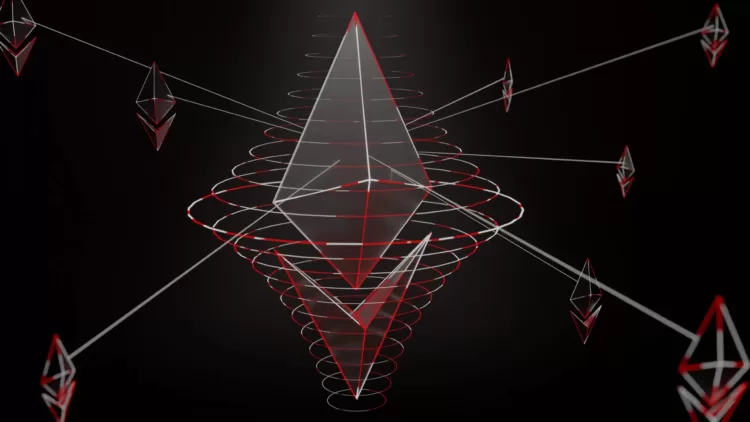
Decentralized Autonomous Organizations (DAOs) are gaining momentum as innovative models of governance and collaboration.
In this article, we delve into the role of Ethereum in empowering DAOs and its use cases.
Ethereum Code, an automated bot fosters a streamlined approach to Decentralized Autonomous Organizations (DAOs) on Ethereum.
The Role of Ethereum in Empowering DAOs
Ethereum serves as a foundation for the implementation of smart contracts, which are self-executing agreements with predefined rules and conditions.
These smart contracts enable DAOs to automate decision-making processes, eliminating the need for intermediaries and establishing a trustless environment.
By leveraging Ethereum’s smart contract functionality, DAOs can achieve a new level of efficiency and transparency in their operations.
One of the key advantages of Ethereum for DAOs is its decentralized infrastructure.
Ethereum operates on a blockchain network, where transactions are verified and recorded by a distributed network of nodes.
This decentralized nature ensures that no single entity has control over the network, making it resilient to censorship and manipulation.
With Ethereum’s robust infrastructure, DAOs can securely store and process data, facilitating transparent governance and secure transactions.
The most widely used token standard, ERC-20, allows the creation and management of fungible tokens.
These tokens serve as a medium of exchange within DAOs and enable participation in governance and decision-making processes.
Furthermore, Ethereum’s ERC-721 and ERC-1155 token standards enable the creation and management of unique and non-fungible assets, opening up possibilities for digital art, collectables, and other innovative applications within DAOs.
By leveraging Ethereum’s capabilities, DAOs can realize their full potential across various domains.
From governance and decision-making to funding and investment, Ethereum-powered DAOs provide a decentralized alternative to traditional systems.
Through decentralized voting mechanisms, DAOs enable stakeholders to have a direct say in organizational matters, promoting inclusivity and fairness.
Moreover, Ethereum empowers DAOs to create decentralized marketplaces where users can trade assets and services directly, without relying on intermediaries.
Peer-to-peer exchanges and decentralized applications (DApps) built on Ethereum allow for secure and transparent transactions, fostering a more efficient and equitable marketplace.
Furthermore, DAOs can leverage Ethereum’s capabilities to enable decentralized collaboration, creating distributed autonomous workforces and facilitating crowdsourcing initiatives.
While Ethereum has greatly empowered DAOs, some challenges and considerations need to be addressed.
Regulatory frameworks for DAOs are still evolving, requiring a careful examination of legal implications and compliance measures.
Scalability is another key area of focus, as Ethereum’s current infrastructure faces limitations in processing a high volume of transactions.
Efforts are underway to enhance scalability through the development of layer 2 solutions and other improvements.
Use Cases of Ethereum-Powered DAOs
Governance and Decision-Making represent one of the most prominent use cases for Ethereum-powered DAOs.
Through decentralized voting mechanisms and consensus-driven decision-making processes, DAOs enable stakeholders to participate in shaping the direction and policies of an organization.
This inclusive approach fosters transparency and fairness, allowing individuals to have a direct say in matters that affect them.
Funding and Investment are another area where Ethereum-powered DAOs have made significant contributions.
Traditional fundraising methods, such as venture capital or initial public offerings (IPOs), often involve intermediaries and high entry barriers.
Ethereum-based DAOs have introduced decentralized fundraising models, such as token sales and initial coin offerings (ICOs), allowing projects to raise capital directly from supporters.
Decentralized Marketplaces have also been revolutionized by Ethereum-powered DAOs.
By leveraging smart contracts and the security of the Ethereum blockchain, DAOs enable peer-to-peer exchanges and facilitate secure and transparent transactions.
These decentralized marketplaces remove the need for intermediaries, reducing fees and enabling direct interactions between buyers and sellers.
Additionally, Ethereum-based decentralized applications (DApps) provide a framework for building marketplaces for specific goods or services, further expanding the possibilities of decentralized commerce.
Collaborative Organizations and Projects have found a natural fit in Ethereum-powered DAOs.
With the ability to create distributed autonomous workforces, DAOs offer an alternative model for collaboration.
Individuals from around the world can come together, contribute their skills, and be rewarded transparently based on predefined rules encoded in smart contracts.
DAOs facilitate decentralized collaboration, empowering contributors and promoting meritocracy.
Crowdsourcing initiatives and collaborative projects benefit from the transparency, efficiency, and inclusivity offered by Ethereum-powered DAOs.
While Ethereum-powered DAOs have demonstrated significant potential, challenges and considerations exist.
Regulatory and legal frameworks surrounding DAOs are still evolving, requiring careful examination and compliance measures.
Scalability of the Ethereum network is another area of focus, as the demand for transactions increases.
Ongoing efforts to improve Ethereum’s infrastructure, including the development of layer 2 solutions, aim to address scalability limitations and enhance the user experience.
Conclusion
Ethereum’s integration of smart contracts and decentralized infrastructure has revolutionized the concept of DAOs.
With enhanced transparency, trust, and autonomy, Ethereum empowers organizations to operate without intermediaries.
Embracing Ethereum’s potential, we can expect DAOs to reshape industries and drive decentralized innovation.